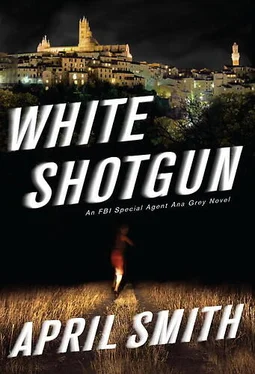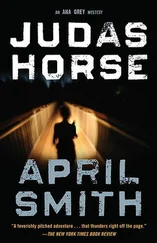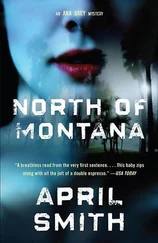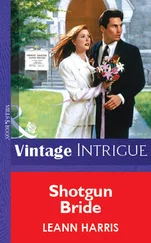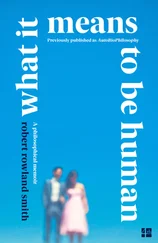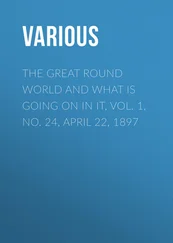April Smith - White Shotgun
Здесь есть возможность читать онлайн «April Smith - White Shotgun» весь текст электронной книги совершенно бесплатно (целиком полную версию без сокращений). В некоторых случаях можно слушать аудио, скачать через торрент в формате fb2 и присутствует краткое содержание. Год выпуска: 2011, ISBN: 2011, Жанр: Триллер, на английском языке. Описание произведения, (предисловие) а так же отзывы посетителей доступны на портале библиотеки ЛибКат.
- Название:White Shotgun
- Автор:
- Жанр:
- Год:2011
- ISBN:978-0-307-59679-6
- Рейтинг книги:4 / 5. Голосов: 1
-
Избранное:Добавить в избранное
- Отзывы:
-
Ваша оценка:
- 80
- 1
- 2
- 3
- 4
- 5
White Shotgun: краткое содержание, описание и аннотация
Предлагаем к чтению аннотацию, описание, краткое содержание или предисловие (зависит от того, что написал сам автор книги «White Shotgun»). Если вы не нашли необходимую информацию о книге — напишите в комментариях, мы постараемся отыскать её.
White Shotgun — читать онлайн бесплатно полную книгу (весь текст) целиком
Ниже представлен текст книги, разбитый по страницам. Система сохранения места последней прочитанной страницы, позволяет с удобством читать онлайн бесплатно книгу «White Shotgun», без необходимости каждый раз заново искать на чём Вы остановились. Поставьте закладку, и сможете в любой момент перейти на страницу, на которой закончили чтение.
Интервал:
Закладка:
“Signorina Grey!”
A young man comes sprinting up from behind, waving. He wears baggy camouflage shorts and a T-shirt that says “Università di Siena.” He has thick black curly hair and wraparound sunglasses on a loop, a beaded choker around his neck.
“I am very sorry. I apologize for being late. I am Giovanni. The son of Cecilia.” “ Ciao, Giovanni!” I laugh with pleasure and relief. He is one handsome dude. Half Salvadoran and half Italian is a hot combo plate. For a moment he hesitates, bouncing on his toes like a basketball player, then swiftly kisses me on each cheek. We hug. He smells like a boy.
“Sorry for the confusion,” I say. “There was a train strike. I had to take a bus. I sent a text—” “No, no, it is completely my fault. I was with a friend, studying for an exam.” “I was expecting to see your mom.” “My mother had to perform an emergency operation at the hospital. I am always late for everything.” He smiles engagingly. “The car is over there,” he says, taking the handle of the suitcase. “Your first time visiting? It is very amazing, you will see.” “You sound proud of your home.” “I love Siena. I would not live anywhere else.” “Not even Rome?”
He snorts. “What’s great about Rome? They are covered by gypsies, like these. Look out.” A clutch of young Romanian mothers and children is coming toward us. The women carry nursing babies wrapped in shawls, like walking Madonnas, except their eyes are smoldering with want and hate. The little kids are trained to swarm the victims and pickpocket while they are distracted.
“Watch your purse,” Giovanni warns loudly, all hyped up and seething with excitement.
“Not to worry. Got it covered.” Giovanni and I sidestep the situation, but instead of letting it be, he goes on the attack.
“Vaffanculo!” he shouts, with an obscene gesture.
The gypsies gather their ranks and move on with downcast eyes. Giovanni continues to shout at their backs. Nobody on the street pays attention.
“They steal your underpants,” he says.
I just smile. “Giovanni, how old are you?” “Sixteen.”
“Sixteen, and you don’t want to leave home? See the world?” He fumbles. “What I’m saying, it comes from my heart. Forgive my English—” “Your English is good.” “In Siena, we believe in the old things. Our blood, our DNA”—he pinches the flesh on his arm—“is pure. It is the same as the ancient Etruscans’. Science proves that we have lived here two thousand years. Right now we are inside the walls of the old medieval city. When you are inside the walls, everything is”—he searches for the word—“beautiful. Inside is life. What we love. Our history. Our church. Our family. Our contrada, which is the neighborhood where you grow up. In America,” he adds self-assuredly, “you call it ‘the hood.’ Inside, we preserve the Republic of Siena. Don’t worry, it’s not like a museum; there are good shops and restaurants, and even an Australian bar where they speak English and have English beer!” A Boddingtons right now would be awesome.
“Outside, there are only enemies. I know it sounds crazy.” He unlocks the smallest car I have ever seen, the size of a corner mailbox.
“Outside everything is bad,” the boy continues, with complete sincerity. “Outside is death.” Giovanni takes a quick route out of Siena and the commercial zone, soon putting us on a deserted country road that undulates through dense forest before breaking out above scores of fields stitched with rows of green. He drives too fast, one hand on the wheel, windows down, constantly jabbering in cheerful tones on his cell phone.
It is hard to find anything remotely lethal in the verdant countryside of cadmium-yellow blocks of sunflowers, cultivated rows of grapes, the lofty Tuscan sky filled with pure white clouds. No wonder they paint clouds on church ceilings; they have unobstructed views of heaven. But for one so young and trendy, Giovanni’s view of things is surprisingly entwined with morbid folklore.
What Cecilia described as “our little house on a hill” is a thirteenth-century compound built by Benedictine monks that later became a residence for a succession of cardinals. It even has a name — Abbazia di Santa Chiara, the Abbey of Saint Chiara — and the hand of the saint is preserved to this day in the sacristy of the abbey church, which is on the other side of the courtyard from the current family wing. Giovanni assures me the relic is a powerful blessing and an object of incalculable value, although a severed hand floating around does not sound to me like very good feng shui.
The road is banked by flimsy wooden poles lashed together. As the lane narrows, the cliff falls away. A hairpin curve reveals a panoramic view of the valley, and you can see the abbey in its entirety — the romantic twelve-sided tower, the two-story residential quarters, and the remains of the original tenth-century church, brutally exposed as if it had been cut in half, leaving nothing but crumbling buttresses and an empty arch.
We drive between rows of dark green cylindrical cypress trees, tips bending in the wind so they uncannily resemble a procession of monks with bowed heads. We turn into a gravel driveway that opens into an empty square big enough to hold a farmers’ market. The engine stops. In the quiet, all you hear is birdsong. The abbey looms around us, rows of iron torches reaching out of sixty-foot pale stone walls that have been standing for over eight hundred years. The scents are pungent — oil of lavender, meat roasting over cedar chips. To the left is the entrance to the restored chapel, where the hand of the dead saint lies.
“I’ll show you to your room and then I have to go.” Giovanni punches the cell phone yet again. “My dad just texted. He says to make yourself comfortable.” I look around. Comfortable, where? The fortified palace, first an austere monastery, then a seat of power for rulers of the church, is no less commanding in its present role as a private residence. The open space is bounded by potted palms and urns filled with geraniums, carefully pruned, not a paper cup to mar the raked gravel yard. The clean perspective of shaded walkways and sun-washed tufa-stone walls creates a solemnity even deeper than the monks’ devotion.
Who are these people who reside like old-fashioned royalty in a compound the size of a five-star resort? God may have lived here once, but the premises have since been vacated; this is about the ascending fortune of a single man. I feel more disoriented than ever, unable to imagine any connection to this foreign way of life, looking for a foothold to dig into for my work as an agent. The insistent beep of Giovanni’s technology does nothing to dispel the eerie sense that when I entered the shadowed hush of this ancient courtyard, the curtain parted to a strange reality.
• • •
I lie down briefly and wake up an hour later. The room floats in quietude. The bedspread is sage-green damask. At the foot of the bed is a folded cashmere throw. The cast-iron headboard is made to look like the tendrils of a sweet-pea vine. A strip of wallpaper with similar coils is set along the midline of eggshell plaster walls. There is one small arched window — no screen, no glass, just a pair of shutters over a grate that frames a grove of olive trees. I stick my face into the fresh air and listen to the regular splash of someone doing laps in a pool that is hidden from my sight. I am a pool rat. In Los Angeles I swim with a Masters team, a mile and a half every day. Nothing could make me happier than to work out right now. After the bus trip from Rome, my neck feels like a tangle of wire. I unpack eagerly, almost frantic from the nearby call of water.
My bedroom is on the second story of the monks’ quarters. I walk along an exterior corridor laid with terra-cotta tile where archways look down on the courtyard. Apricot-colored draperies are gathered in the arches, the sun hitting them like golden chimes. Centuries of leather sandals and whisperings of prayer have softened the air and smoothed the stone.
Читать дальшеИнтервал:
Закладка:
Похожие книги на «White Shotgun»
Представляем Вашему вниманию похожие книги на «White Shotgun» списком для выбора. Мы отобрали схожую по названию и смыслу литературу в надежде предоставить читателям больше вариантов отыскать новые, интересные, ещё непрочитанные произведения.
Обсуждение, отзывы о книге «White Shotgun» и просто собственные мнения читателей. Оставьте ваши комментарии, напишите, что Вы думаете о произведении, его смысле или главных героях. Укажите что конкретно понравилось, а что нет, и почему Вы так считаете.
